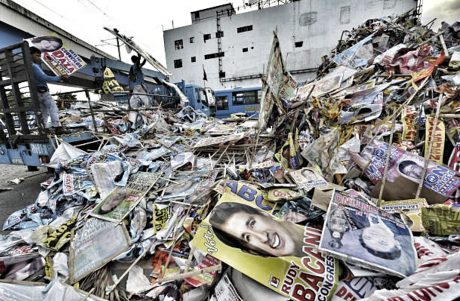
Too many colours. Too many symbols. Too many sound bytes. Philippine politics is framed by the clever work of public relations (PR) consultants who craft poetic messages that extend strong emotional hooks that the public readily bites. Because of the potent emotional payload of the messaging that makes up the bulk of the campaign rhetoric spewed by politicians during the campaign, there is hardly any room for true intelligent debate or even just modern thinking.
It is ironic that the bloc of partisans that suffer the most from this focus on the use of colour and symbolism to appeal to emotion — the Liberal Party (a.k.a. the Yellowtards) — have so far failed to see the long-term problem of this approach. The Yellowtards have come full circle in their experience of how the double-edged sword of extreme emotional branding that they crafted can swing both ways. It swung one way from 1983 through to 2009 losing momentum over the course of the term of President Benigno Simeon ‘BS’ Aquino III before beginning its return-swing that would deal a fatal blow for the Liberal Party in the lead up to the 2016 elections.
In effect, the narrative branded by the yellow colour, the “Laban” sound byte, and the symbolic “L” hand gesture had turned against its creators. So poisoned now is the yellow colour in Philippine politics that even an innocent piece of literature like the book Digong Dilaw could stain an otherwise innocuous activity such as that of “vice president” Leni Robredo reading it to a group of kids at a day care facility — all thanks to this book’s unfortunate coincidental double-reference to a sitting president and the Yellowtard narrative. That a children’s book could be easily turned toxic by a country’s politics says something really important about said politics.
For some context, step back a minute and regard the notion of “clickbaiting” from a broader perspective. It has recently become fashionable to be noisily critical of the prevalence of “clickbait” content on social media platforms like Facebook and Twitter. Crafting clickbait has been turned to a science by the most clever of social media-savvy folk who manage to remain steps ahead of efforts by these now-lumbering corporate Silicon Valley colossi to “clean up their act”. This leads us to thinking about what it is these Social Media Cleanup Warriors really want of Facebook and Twitter. Both these businesses offer platforms that empower their respective users to reach a mass audience for free. The social contract in social media is, therefore, that everyone — both consumers and producers of content — opt in for free.
Free opt-in onto a network of media producers and consumers is not something Facebook and Twitter invented. Social media only created the cyrberspace equivalent of public squares and plazas where markets for physical and information goods and services have been springing to life since the dawn of civilisation. In the same way that Netizens do today, Jesus Christ himself competed for a flock of followers with other street prophets by crafting and hawking emotionally-appealing and, as such, competitive messages and narratives. If there were such things as “fake news” police forces back then, the Prince of Peace, along with other similarly-robed and sandalled charismatic young men roaming the fishing villages and bazaars of the time will likely have been hauled off for an appointment with Pontius Pilate. Hey wait…
The point is, the most successful cults of personality, symbolism, and narration in human history built their audience and followings by competing within free markets over all of that history. The fundamental nature of those free markets had not changed. The chatter and the methods used to attract eyeballs and ears and converting these to permanent followers has not changed even as these markets moved from the Roman piazzas onto the digital networks of today.
One thing has changed, however; and that is the way people think. Modern educated people are now presumably equipped with the intellectual skills and tools to step back from their emotions, take stock of facts and stitch these facts together into coherent and logical frameworks. Today, many irrational fears could be easily overcome by thinking through readily-available information by applying an educated mind. Among educated and intelligent people, mere belief has taken a back seat to critical thinking.
At least, we’d like to think so.
Comes back to regard the state of Philippine politics and the so-called “discourse” surrounding it and you’d quickly realise with the benefit of the context provided here so far how astoundingly primitive it remains. Beliefs still trump critical thinking. Cults and religions prevail over scientific communities. Symbols and tall tales rather than sound informative ideas dominate the conversation. A typical political campaign encapsulates all these elements of primitive thinking that infests Philippine politics. Perhaps it is high time Filipinos realise that there is something really wrong with those loudly-coloured banners unfurled, pins, placards, and shirts sported, those shrill voices and the mono-syllabic slogans they spew, and the meaningless symbols flashed in one or the other political activity, movement, event mounted, or statement issued by one or another political camp, party, or bloc. They’re all the same hooks tipped with potent emotional opiates but bereft of any real substance that a truly modern human mind can wrap itself around.
Before so-called “thought leaders” can even decide who to vote for or even presume to tell others who or who not to vote for, they should first uplift the thinking they apply to their politics — purge their minds of belief and step up to a more conscious effort to critically-evalute their options. To be truly free is to be able to be personally accountable.

No comments:
Post a Comment